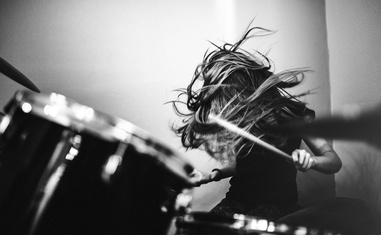The views expressed in our content reflect individual perspectives and do not represent the authoritative views of the Baha'i Faith.
About a year ago, I took up playing the drums — accidentally. I wandered into my local senior center, heard music, sat down with a band playing old tunes, and just didn’t get up for two hours. I was having fun, pure and simple.
As I was about to walk out, the band leader asked if I’d like to join as a singer, and I said, “Well, I don’t know if I’m much of a singer.”
He said, “Well, I saw you moving your lips.”
Laughing, I replied, “If that’s the criteria, I’m in.”
Then he asked if I’d like to play a snare drum someone had donated. Their 13-person group of guitars, pianos, ukuleles, and vocalists had only a single wash-tub base as a rhythm section.
RELATED: The Mystic Music of the Soul
“Would I!” I exclaimed and then added breathlessly, “My dad was a jazz drummer who had a big kit in our garage. He blasted out Benny Goodman night after night, but he never let me touch them. He said, ‘Drumming isn’t for girls.’ But sometimes, I would sneak out there and play the snare with brushes. I could start there.”
Now he laughed and said, “Whatever works. I just know I need something to pull us all together. I feel like I am herding cats!”
I realized later that I had probably been influenced, too, by this inspiring passage from the writings of Abdu’l-Baha:
Make haste, make haste, for time is short and the minstrel’s melody is nearing its end. If, at this feast, thou dost not clap thy hands, beat the drum, lift up thy voice, and sing out the songs of joy, when wilt thou then know blissful rapture and heavenly intoxication?
So, in a spirit of joy, fun, and heavenly intoxication, I started the next week with my snare and my brushes — just a little tap, tap to the beat. Not too loud. I didn’t want to make too much noise.
But that didn’t really do it. They couldn’t hear me, and they needed to hear, so I added a suitcase — yes, a suitcase with a drum pedal.
That sounded better, but why not add a high-hat too, I finally decided — and I better take some lessons. So it went until now I have two full drum kits and a new hairdo and sunglasses to wear to gigs. (Maybe I am a “real drummer” if I have gigs, right?)
You see me here wrestling with a very serious case of “impostor syndrome,” the belief that one’s accomplishments are the result of luck or a mistake that will soon be undone.
But hey, go easy on me. As it turns out, statistics show that currently, only about 10% of drummers are women, and they don’t even track how many of those are over 65. Why is that?
Near as I can figure, it’s because drums act as a symbol of power — military and political power, of course, as in marching bands, but spiritual power too, and certainly, the power of music itself. Drums set the foundational rhythmic pulse of music and act as a kind of bottom-end binding agent that holds a band together, assembling that herd of cats.
The tempo and consistent beat form the backbone of a piece of music that conveys the emotional tone, the highs, lows, and inflection points intended by the composer.
Drums strike a deep primeval chord within us, too. Layne Redmond, in her fascinating book, “When Drummers Were Women: A Spiritual History of Rhythm,” explains that the drum was sacred to ancient peoples. It symbolized the circle of life. It was associated with fertility and, before patriarchy, was mostly played by women.
The ancient frame drum appeared as far back as Neolithic times. The earliest documented one was made of alligator skins stretched over a round wooden frame. The Bronze Dong Son drums were made in northern Vietnam in 3000 BC. The snare drum and a kit of bells and timbrels appeared in the 1600s, while our modern drum set with foot pedal, high hat, and bass drum did not appear until the American jazz age of the 1920’s-1940s — my dad’s time.
Drums carry a highly spiritual significance too. First Nations people consider drum songs to be gifts from the Creator to be shared in ceremonies, each song having a different meaning or purpose — celebration, supplication, preparation for harvest or hunt, healing, gratitude, birth, death, and coming of age. The drum is so important to some First Nations, they believe the drum itself has a spirit of its own, the heartbeat of Mother Earth.
Recent scientific research on the health benefits of drumming is impressive. It strengthens muscles, improves coordination and circulation, reduces blood pressure, and relieves anxiety, stress, depression, and pain while improving the immune system. It enhances focus and concentration and combats overall cognitive decline.
Given the depth, breadth, and spiritual significance of drumming, not to mention its health benefits, I have been having a hard time understanding some of the feedback I have gotten from friends and acquaintances when I say, “I am a drummer.”
One female neighbor said, “I think you like to shock people.” A fellow male drummer asked, “Can you keep up?” A young woman said, “It’s OK to brag about yourself.” A man in a restaurant asked, “Do you actually drum with a band or just home alone?” OK, some folks have said with surprised disbelief, “That’s cool,” and changed the subject, but so far, no one has said, “Drums have a deep spiritual and historical significance and are good for your health!”
The only explanation I can see for these comments is sexism, the conscious or unconscious belief that somehow maleness is required for drumming. I guess I believed it too, to some extent, or why in the world would I try to drum “quietly” at first? Now, that’s an oxymoron if I ever heard one.
These ridiculous ideas are a symptom of the pernicious state of inequality between men and women that infects our world today. The Baha’i writings clearly point out the damaging effects of these beliefs:
… among the teachings of Baha’u’llah is the equality of women and men. The world of humanity has two wings — one is women and the other men. Not until both wings are equally developed can the bird fly. Should one wing remain weak, flight is impossible. Not until the world of women becomes equal to the world of men in the acquisition of virtues and perfections, can success and prosperity be attained as they ought to be.
Viola Smith, one of my drummer heroines, is known as the first professional female drummer of modern times. She got her start in an “all-girl” band with her sisters in the 1920s but later transitioned to solo play with the best bands of the era. She became known as “the world’s fastest girl drummer” or the “female Gene Krupa.” She began drumming at 12 and was still at it well into her second century. She lived to 108, adding credence to those “health benefit” claims for sure.
RELATED: How Writing Music Helped Me Find Beauty in Life
At the end of her life, Viola said she was getting tired of being called the “female Gene Krupa.” She said, “Why don’t they call him the male Viola Smith?”
Yeah. Why don’t they? Why don’t they just say just “fast drummer,” and not specify a gender? Drums are for everyone! They tap the beat of our hearts and souls. They stir our true selves to life. They vibrate as our bodies and minds vibrate to the rhythms of the universe.
The drumbeat sounds like a call to action. Listen to the drumming of your own heart — and know the hearts of all drum to these same rhythms. Listen to this soaring passage from Baha’u’llah’s mystical poem, The Clouds of the Realms Above:
Behold the soul-entrancing song, behold the beating of the drum, Behold the sacred rhythms that from Our hand are raining down.
Behold the Countenance Divine! Behold the Maid of Paradise! Behold the grace upon the world from Our own presence raining down.

















Comments
Sign in or create an account
Continue with Facebookor